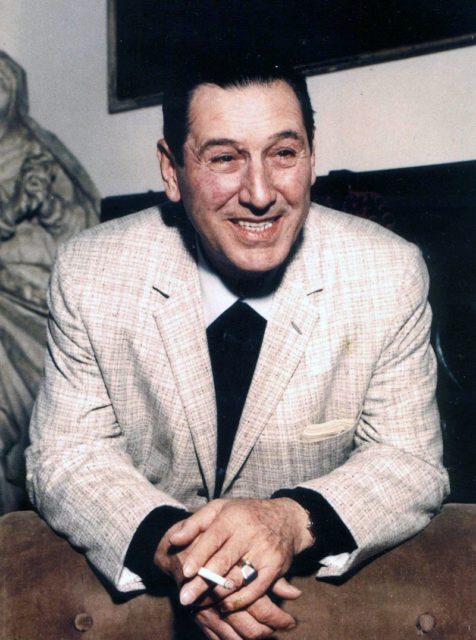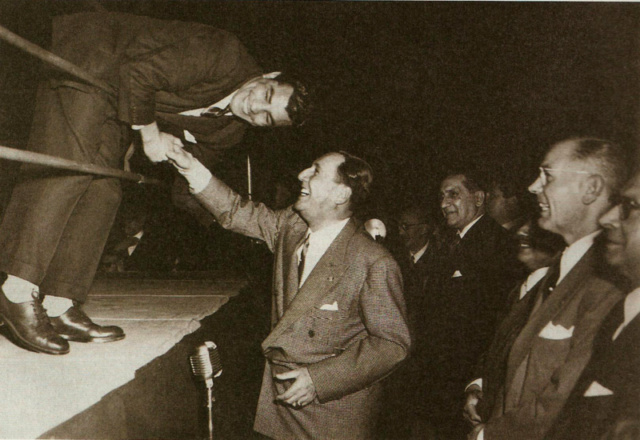During the mid-20th century, the South American nation of Argentina was governed by the charismatic Juan Domingo Peron, who was so popular with Argentinians that they elected him as president for three terms. Peron had run the nation for two consecutive terms, from 1946 to 1955, when he was overthrown in a coup d’état; he was reelected in 1973 and served as president until his death in 1974.
Peron’s wife Eva became a national icon during his first presidency as she championed for workers’ and women’s rights. After her early death from cervical cancer in 1952, Eva’s life story was immortalized in the popular musical and film Evita, for which her nickname was used as the title. Despite his wife’s powerful legacy and his own skill as a leader, there were aspects of Peron’s presidency that were troubling, the most notable being how he supported fleeing World War II criminals. Infamous Nazis such as Adolf Eichmann and Josef Mengele were admitted, even welcomed, into Argentina. Understanding why Peron allowed this requires examination of Argentina’s history before and during World War II, Peron’s own political beliefs, and other important factors such as the country’s widespread anti-Semitism.

Before the onset of World War II, Argentina had long-standing ties with Spain, Italy, and Germany – countries that would later band together as the Axis powers. Argentina had been colonized by Spain–the country’s official language is Spanish–and over decades immigrants from Germany and Italy populated the country. Juan Peron had even served as an adjunct military officer in Italy during the war years of 1939 to 1941, and he greatly admired Italian fascist leader Benito Mussolini.
When World War II began, Argentina was technically neutral, but there was huge support for Axis powers throughout the country, not only due to the nation’s historical and ancestral ties with Axis countries but also because of its flagrant anti-Semitism. The small Jewish population of Argentina, which contributed much to the nation’s economy, was being persecuted by non-Jews even before World War II started. Argentina refused Jewish immigration to the country during Nazi pogroms, and Peron’s Minister of Immigration, Sebastian Peralta, made no effort to conceal his own anti-Semitic beliefs. However, European Jews with the appropriate means to bribe bureaucrats or with the right connections in the Argentinian government would sometimes be allowed entry.
The country supported the Axis cause as actively as possible, and Argentina was filled with Nazi agents, while Argentinian officers and spies roamed throughout Germany, Italy, and parts of occupied Europe. Argentina purchased arms from Germany in fear of hostilities with Brazil, which supported the Allied countries in the war. In return, Germany vowed major trade concessions to Argentina once the war was over.
Argentina also used its neutral status to foster peace agreements between Axis and Allied forces. Under pressure from the United States, it broke ties with Germany in 1944, joining the Allies in 1945 one month before the war ended and when Germany’s defeat was certain. While public perception was that Argentina was doing the right thing, Juan Peron privately told his German acquaintances that everything was just for show. Most Argentinians were saddened that Germany surrendered in 1945, which made it a welcome atmosphere for fugitive Nazis to seek asylum.

Peron himself believed he was helping out associates, and he actively assisted Nazis fleeing to Argentina. Agents were dispatched to Europe to provide the fugitives with money, papers, and arrangements for traveling into the country. No one was refused, no matter how horrific their war crimes, and they were set up in Argentina with money and jobs. Peron met personally with many of them.
In the confusing post-war years, Peron strongly felt that these men would be useful. Many people believed that the Soviet Union was a much greater threat than Germany; some even thought that during the war the United States should ally with Germany against the Soviet Union and its system of communism.
Peron believed this as well; by the end of World War II, he predicted that a third world war would erupt between the United States and the Soviet Union no later than 1949. His plan was for Argentina to become a major neutral country in a “third position”; affiliated neither with capitalism nor communism, Argentina could be the country to offset the balance between one system or the other. Former Nazis would be valuable in such a scenario since they were highly trained soldiers with a deep-seated hatred of communism.

Peron continued his support of Germany throughout his presidency, expressing anger about the notorious Nuremberg Trials, which held former high-ranking Nazis accountable for war crimes and crimes against humanity. He also worked with the Catholic Church to gain amnesty for refugee Nazis in Argentina.
After the coup d’état that ended his presidency in 1955, Peron was exiled and did not return to Argentina until almost 20 years later. The Nazis that Peron had protected were alarmed by the change in leadership, but they had other reasons to be concerned. Mossad agents from the newly-formed country of Israel were hunting Nazi war criminals with a vengeance. In 1960, former Nazi Adolf Eichmann, one of the chief organizers of the Holocaust, was captured in Buenos Aires by Mossad agents and taken to Israel to stand trial. The Argentine government’s complaint to the United Nations about the matter went nowhere.

In the following years, Argentina began to extradite some of its Nazi war criminals to Germany to face justice, including Gerhard Bohne, Erich Priebke, and Josef Schwammberger. One of the most infamous Nazi war criminals hiding out in Argentina was Josef Mengele, the doctor of Auschwitz who performed horrifying medical experiments on prisoners.
Rather than face capture, he fled Argentina for Brazil, where he remained hidden until his death in 1979. Other Nazi fugitives in Argentina fled for refuge in nearby South American countries as well. Those who remained and were never discovered blended into Argentina’s German communities and kept their mouths closed about their pasts. They became quietly productive members of Argentinian society, About Education reported.

Argentina was not helped by protecting Nazi war criminals in the way Peron had hoped. Instead, its global reputation was tarnished as more people realized that not only had Argentina sheltered fugitive Nazis but it had actively recruited them.
Read another story from us: The escape of Nazi criminals to Argentina
Despite the popularity with Argentinians that led to his reelection in 1973, Juan Peron’s legacy is also marred by his post-war actions and political decisions.
